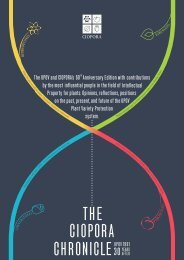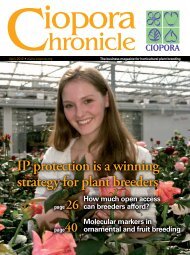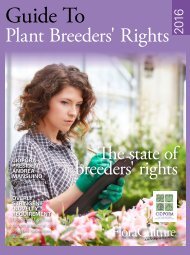2011 CIOPORA Chronicle - the 50th Anniversary Edition
CIOPORA annual magazine on Intellectual Property protection for plant innovations 2011. The magazine was produced in cooperation with FloraCulture International. Read in the 2011 CIOPORA Chronicle edition: - CIOPORA plays vital role in supporting the industry - PVR litigation on the rise - Plant Breeders´Right. Quo vadis? - China deploys national strategy for IPR - CIOPORA helps IP owners protect their rose varieties and much more...
CIOPORA annual magazine on Intellectual Property protection for plant innovations 2011. The magazine was produced in cooperation with FloraCulture International.
Read in the 2011 CIOPORA Chronicle edition:
- CIOPORA plays vital role in supporting the industry
- PVR litigation on the rise
- Plant Breeders´Right. Quo vadis?
- China deploys national strategy for IPR
- CIOPORA helps IP owners protect their rose varieties
and much more...
You also want an ePaper? Increase the reach of your titles
YUMPU automatically turns print PDFs into web optimized ePapers that Google loves.
Jurisdictions<br />
There is a significant<br />
rise in <strong>the</strong> number<br />
of plant variety<br />
rights cases in <strong>the</strong><br />
horticultural sector<br />
throughout Europe.<br />
This article gives<br />
a comprehensive<br />
overview of court<br />
decisions from <strong>the</strong><br />
most prominent<br />
jurisdictions.<br />
by Philippe de Jong and<br />
Thomas Leidereiter*<br />
PVR litigation<br />
on <strong>the</strong> rise<br />
When compared to trademark<br />
or patent cases,<br />
<strong>the</strong> number of court<br />
decisions dealing with plant variety<br />
rights (PVR) is still limited. One<br />
reason for this is that most breeders<br />
in <strong>the</strong> horticultural and fruit industry<br />
run small to medium-sized businesses<br />
and ra<strong>the</strong>r use <strong>the</strong>ir financial<br />
means to promote R&D activities<br />
than to engage in legal proceedings.<br />
Also, breeders generally tend to<br />
have mixed feelings about engaging<br />
in legal battles against competitors<br />
or growers. Challenging <strong>the</strong><br />
validity of a competing variety, for<br />
example, may seriously affect existing<br />
business relationships with that<br />
competitor.<br />
Similarly, suing a grower for<br />
infringement often feels like cutting<br />
into your own hand, as every grower<br />
is a potential customer. Over <strong>the</strong><br />
past years, however, PVR owners<br />
have become increasingly aware of<br />
<strong>the</strong> major importance of enforcing<br />
<strong>the</strong>ir rights and have realised that<br />
this is not necessarily to <strong>the</strong>ir detriment.<br />
The result is a significant rise<br />
in <strong>the</strong> number of court decisions in<br />
<strong>the</strong> horticultural sector throughout<br />
Europe. This contribution does not<br />
envisage discussing all relevant<br />
cases, as <strong>the</strong>re would not be enough<br />
room for that. Instead, <strong>the</strong> authors<br />
highlight a number of decisions<br />
from <strong>the</strong> most prominent jurisdictions<br />
which <strong>the</strong>y feel to be relevant.<br />
CJEU<br />
Recently, <strong>the</strong> Court of Justice of<br />
<strong>the</strong> European Union (CJEU) issued<br />
its first and so far only ruling on<br />
PVR in <strong>the</strong> ornamental sector.<br />
In SUMCOL 01 1 <strong>the</strong> CJEU has<br />
set out decisive standards for <strong>the</strong><br />
judicial review of decisions issued<br />
by <strong>the</strong> Community Plant Variety<br />
Office (CPVO) and its Board of<br />
Appeal (BoA).<br />
In this case, <strong>the</strong> plaintiff had applied<br />
for Community Plant Variety Right<br />
(CPVR) protection for his variety<br />
SUMCOL 01 (Plectranthus ornatus).<br />
The variety, however, could not<br />
be clearly distinguished from plants<br />
originating from a private South<br />
African garden, which were held to<br />
be of common knowledge.<br />
Consequently, <strong>the</strong> application was<br />
rejected as was <strong>the</strong> appeal before<br />
<strong>the</strong> BoA. The case went up to <strong>the</strong><br />
General Court of <strong>the</strong> European<br />
Union (GCEU), which held 2 that,<br />
due to <strong>the</strong> botanical complexity<br />
of <strong>the</strong> distinctness requirement,<br />
<strong>the</strong> GCEU is entitled to limit<br />
itself to a review of manifest errors<br />
of assessment by <strong>the</strong> BoA. The<br />
GCEU, fur<strong>the</strong>rmore, held that <strong>the</strong><br />
publication of a detailed description<br />
of a plant variety may be taken into<br />
account when establishing common<br />
knowledge. The CJEU confirmed<br />
this ruling.<br />
As a result of this decision, breeders<br />
need to be aware that decisions<br />
of <strong>the</strong> CPVO and its BoA, when<br />
dealing with botanical questions,<br />
such as distinctness, uniformity<br />
or stability, will only be subject to<br />
legal review to a very limited extent.<br />
However, it must be questioned<br />
whe<strong>the</strong>r such limitation is in<br />
line with <strong>the</strong> requirements of <strong>the</strong><br />
TRIPS agreement, which requires<br />
that parties to a proceeding shall<br />
have an opportunity for review by a<br />
judicial authority of final administrative<br />
decisions.<br />
GCEU<br />
One fur<strong>the</strong>r decision has been<br />
rendered by <strong>the</strong> General Court<br />
of <strong>the</strong> European Union (GCEU)<br />
regarding a fruit variety. The Gala<br />
Schnitzler case 3 dealt with an apple<br />
(Malus Mill) variety. Upon <strong>the</strong><br />
filing of <strong>the</strong> application, <strong>the</strong> CPVO<br />
requested <strong>the</strong> applicant to submit<br />
plant material necessary for <strong>the</strong><br />
technical examination and stated<br />
that <strong>the</strong> applicant was “responsible<br />
for complying with phytosanitary<br />
requirements”.<br />
However, <strong>the</strong> phytosanitary certificate<br />
was missing and <strong>the</strong> plant<br />
material proved to be virus infected.<br />
The CPVO concluded that its<br />
instructions had not been entirely<br />
clear and allowed <strong>the</strong> applicant to<br />
re-sent virus-free material. After <strong>the</strong><br />
DUS-test, <strong>the</strong> holder of <strong>the</strong> closest<br />
reference variety ‘Baigent’ lodged<br />
an objection against <strong>the</strong> candidate<br />
variety. He claimed that <strong>the</strong> office<br />
was not authorised to allow fur<strong>the</strong>r<br />
material to be submitted and<br />
should have rejected <strong>the</strong> application.<br />
While <strong>the</strong> BoA confirmed <strong>the</strong><br />
objector’s point of view, <strong>the</strong> GCEU<br />
held that it is consistent with <strong>the</strong><br />
principle of sound administration<br />
for <strong>the</strong> CPVO to correct defaults in<br />
its instructions.<br />
Thomas Leidereiter.<br />
14 www.<strong>CIOPORA</strong>.org | <strong>CIOPORA</strong> <strong>Chronicle</strong> April <strong>2011</strong>









